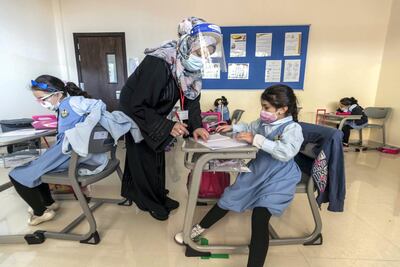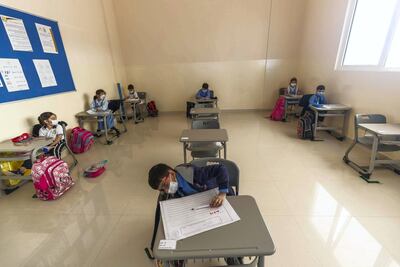A Sharjah pupil found herself in a class of her own when she returned to school for the start of the new term.
Shatha Al Qadi, 15, decided to resume in-person lessons in the New Year at Al Shola Private School in Al Falah but had no classmates for company as remote learning continues to hold sway in the emirate in the age of Covid-19.
Education authorities in Sharjah provided parents with the option of continuing distance learning - first implemented in March to slow the spread of the virus - or traditional face-to-face lessons.
“I did online learning for two weeks in the first semester, but I didn’t like it,” said Shatha, a Grade 10 pupil.
“So this semester, I decided to come back to school since I had the option, but as you can see, I came to an empty classroom.
“I was scared at first to come back to school but seeing all these measures in place, I felt it would be fine.
“I would like to see more classmates back to school.”
Classrooms remained largely empty at Shatha's school and across the emirate's 116 private schools.
Of the 168,766 pupils taught on the first day of term on Sunday, only 19,198 (12.8 per cent) were present in classrooms.
While attending to Shatha’s education, her teacher was also giving remote lessons to pupils who opted for online learning.
Class sizes at the school have been capped to 12 line with social distancing measures.
Shatha's class was set up for a maximum of nine pupils, but so far only she has opted for in-person lessons.
Her schoolmate Sarah Ebraheem, 15, in Grade 11, learned from home the entire first term.
“But the atmosphere in a classroom is more stimulating, so I decided on in-class learning for this semester,” said Sarah.
Just 97 of 647 pupils in grades 9 to 12 opted to return to their seats at Al Shola Private School.
“The number of those in campus, is slightly higher among younger pupils but overall, the majority of pupils opted for online learning,” said Ibraheem Barakeh, director of Al Shola Schools Group.

“In Kindergarten we have 78 per cent of pupils come to school, but then the percentage declines the older the pupils are.”
According to statistics from the school, 42 per cent pupils attend classes in school from grades 1 to 4, with this figure dropping to 28 per cent for grades 5 to 8.
Of the 9,133 pupils served by the five schools in the Al Shola group, 3,234 are currently attending lessons in person.
Mr Barakeh believes a blended approach to education is challenging for pupils and puts teachers under pressure to manage lessons for those in class and others who are behind screens.
“The way I see it, it should either be all online education or all in-class education, but the second option is only a possibility once a vaccine has proven efficient,” he said.
Mr Barakah believes ongoing concerns over catching the virus are a key factor in the high number of pupils opting to learn online.

“Other reasons are related to how older pupils enjoy more freedom at home or feel that the time spent on the road is a wasted time, and also to how they feel they are better off away from all safety requirements if they came to school,” he said.
Safety implications remain at the forefront of parents' minds.
Sahar Hamzeh, whose son in Grade 7 is diabetic, found keeping her son home gave her greater peace of mind.
“I wouldn’t want to risk his life and since I was given an option allowing him to study home, I certainly did so to ensure his safety,” she said.
“Sending him to school means putting him at the risk of catching the Covid-19 infection.”
Aidah Ahmad said remote learning was more cost-effective after the pandemic took a financial toll on her family.
“My husband was dismissed from his job, and saving school transportation money was one way to cut down expenses,” said Ms Ahmad, a mother of a 9th grader who studies online.
Sharjah Private Education Authority has formed a 15-member committee, headed by its director Ali Al Hosani, to follow up and evaluate cases of Covid-19 in private schools.








